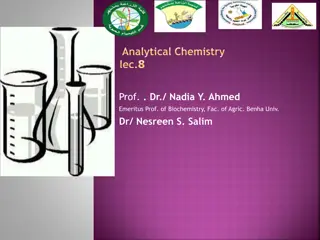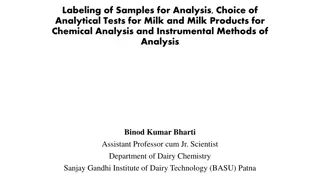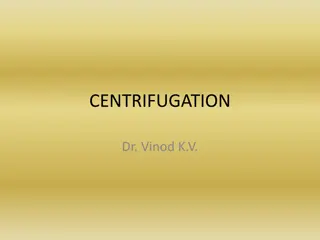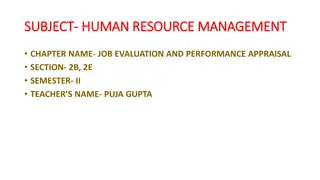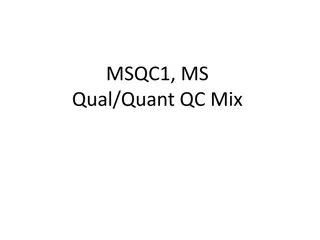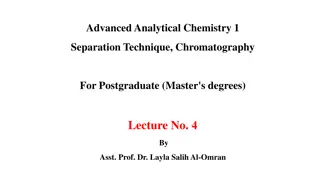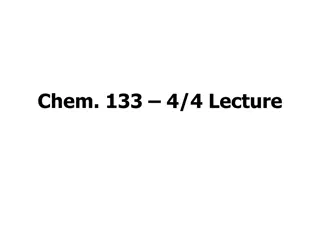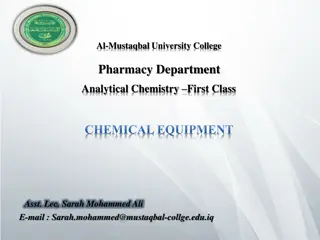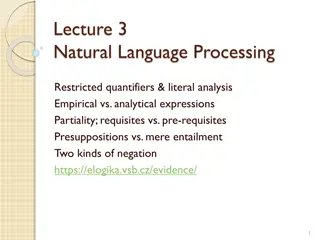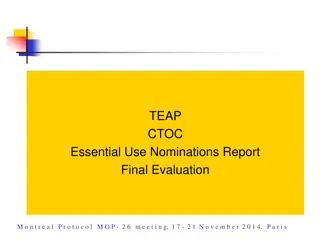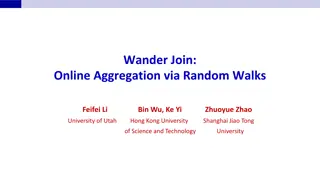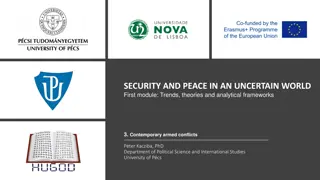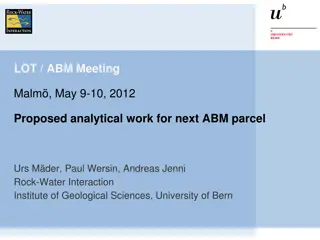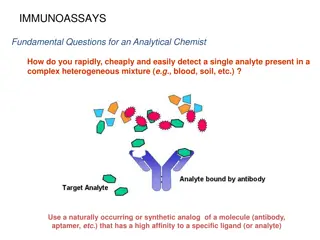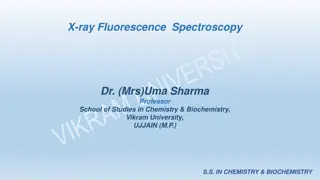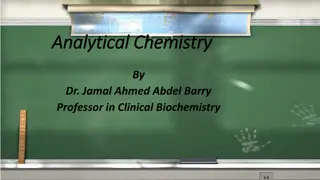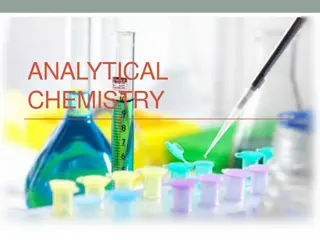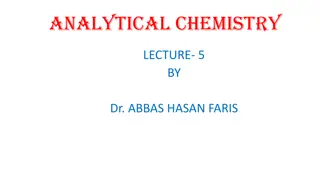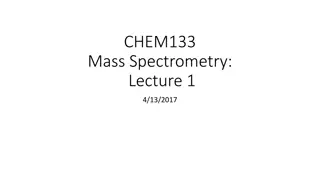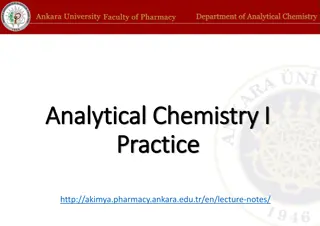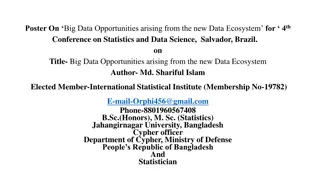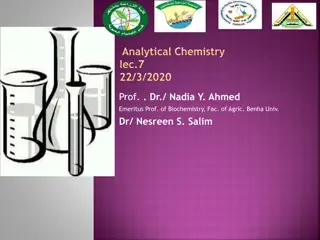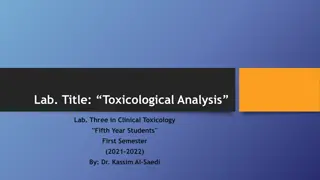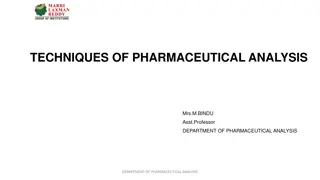Revolutionizing Data Management with HTAP Databases
Organizations handle a vast amount of data daily, necessitating efficient systems like Hybrid Transactional Analytical Processing (HTAP). This advanced system streamlines online transaction processing (OLTP) and analytical processing (OLAP), enabling real-time insights and prompt actions. HTAP datab
2 views • 22 slides
Population and Housing Censuses Directorate - Midterm Review Mission Summary
The Population and Housing Censuses Directorate (PHCD) is actively involved in implementing various censuses, updating geographical databases, and conducting analytical studies. They are preparing for the next census in 2027 by learning from international experiences and modern methodologies. The di
0 views • 12 slides
National Conference of Enforcement Chiefs: Enhancing Tax Compliance and Enforcement Practices
The National Conference of Enforcement Chiefs held by the Commercial Taxes Department, Government of Andhra Pradesh, focused on nurturing tax compliance, targeting evasion cases, preventing harassment, and overseeing tax administration to curb high-pitch demands. The enforcement wing emphasized data
0 views • 16 slides
Cleveland Airport System Environmental Analytical Services Pre-Qualification Meeting Overview
The City of Cleveland, Department of Port Control is hosting a pre-qualification meeting for environmental analytical and regulatory services for the Cleveland Airport System. The meeting agenda includes project scope, safety and security requirements, operations, DBE requirements, and a Q&A session
0 views • 35 slides
Understanding Solutions and Precipitation Reactions
Solutions are classified as saturated, unsaturated, or supersaturated based on the concentration of solute in the solvent. Solubility plays a critical role in determining the amount of solute that can be dissolved in a solvent at a given temperature. Reactions yielding products of limited solubility
6 views • 10 slides
Analytical Balances Market Overview, Trends, Landscape Overview Forecast 2022-20
Adroit Market Research has included the Global Analytical Balances Market\u00a0research to its database in order to provide a thorough analysis of the variables driving a general market growth trend. The study contains a lot of information and is a useful tool for professionals in the field.
0 views • 5 slides
Overview of Analytical Positivism in Legal Theory
The Analytical Positivism school, also known as the Austinian school, emphasizes a sharp separation between law and morality. It views law as a command and emphasizes the importance of law as it is, rather than how it ought to be. This approach, championed by thinkers like John Austin and Jeremy Ben
0 views • 19 slides
Back Titration in Analytical Chemistry
Back titration is a technique used in analytical chemistry to determine the concentration of an analyte by reacting it with an excess of another reagent first, followed by titration of the excess reactant. This method is especially useful in cases where direct titration endpoints are difficult to di
2 views • 14 slides
Guidelines for Sample Labeling and Analytical Tests in Milk Products Analysis
Understanding the importance of food labeling in milk products analysis, this article covers the process of labeling samples for various analytical tests. It emphasizes the need for precise information on sample containers, including supplier details, sampling date/time, product nature, identificati
0 views • 13 slides
Understanding the Applications and Design of Analytical Ultracentrifugation
Analytical ultracentrifugation, a powerful technique in biochemistry, allows for precise measurement of sample properties and characterization of macromolecular complexes. The method is widely used for determining sample purity, equilibrium constants, and assembly mechanisms of biological complexes.
1 views • 17 slides
Importance and Methods of Job Evaluation in Human Resource Management
Job evaluation is essential in determining the value of a job within an organization, aiding in fair pay structures, employee selection, bonus calculations, and conflict resolution. However, it has disadvantages like inaccuracies, time consumption, and complexity. Steps involved include job analysis
3 views • 11 slides
Comprehensive Analysis of MS Qual/Quant QC Mix for Platform Characteristics Assessment
The MS Qual/Quant QC Mix (Sigma Aldrich) is designed for daily use in evaluating platform characteristics such as repeatability, system stability, and inter-/intra-platform comparisons. The content includes XIC analysis for peptides, a detailed table showing the difference in peak ratios, and correl
0 views • 11 slides
Understanding Ion Exchange Chromatography in Analytical Chemistry
Ion exchange chromatography is a powerful separation technique that isolates ions and charged molecules based on their affinity for a charged matrix. This method involves interactions between the analyte and matrix influenced by factors like net charge, ionic strength, and pH. Through cation exchang
1 views • 18 slides
Understanding Atomic Spectroscopy and Atomization in Analytical Chemistry
Explore the principles of atomic spectroscopy through examples and theories, focusing on topics such as the Boltzmann distribution problem and atomization processes using flames. Learn about the challenges and complications in atomization, including issues with nebulization efficiency and poor volat
4 views • 20 slides
Common Laboratory Equipment and Their Uses in Analytical Chemistry
The pharmacy department's first-class in analytical chemistry at Al-Mustaqbal University College utilizes various common laboratory equipment for safe practices. This includes the balance for measuring mass, ring stand for holding glassware, graduated cylinder for precise liquid volume measurement,
0 views • 20 slides
Introduction to Analytical Chemistry and pH Detection
Analytical chemistry involves the study of detecting acids and bases in solutions, with methods such as litmus testing and the Arrhenius definition. The concept of conjugate acids and bases, acid dissociation, and buffer solutions are also key components in understanding chemical properties and reac
1 views • 36 slides
Embracing Positive Behavior Support in Our Team's Journey
Journey together towards achieving more by embracing positive behavior support in a team setting. Celebrate individual traits and roles that contribute to a cohesive and successful team dynamic, fostering nurturing, dependable, and analytical traits among members. Meet the diverse personalities cont
0 views • 19 slides
Understanding Empirical vs Analytical Expressions in Natural Language Processing
Restricted quantifiers and literal analysis in natural language processing reveal the distinctions between empirical and analytical expressions. While empirical expressions refer to non-trivial intensions that require empirical investigation, analytical expressions denote constant intensions that ca
1 views • 19 slides
Reassessment of Essential Use Nominations for Laboratory and Analytical Applications of CTC
The Clean Development Mechanism Executive Board's Technical and Economic Assessment Panel (TEAP) and the Chemical Technical Options Committee (CTOC) conducted a reassessment of the Essential Use Nomination (EUN) of 80 tonnes of Carbon Tetrachloride (CTC) for laboratory and analytical purposes in Chi
0 views • 4 slides
Wander Join: Online Aggregation via Random Walks in Database Workloads
Wander Join is a technique for online aggregation using random walks, addressing challenges in efficiency and correctness in both transactional and analytical database workloads. It allows for complex analytical queries such as TPC-H queries and provides insights into revenue loss due to returned or
0 views • 27 slides
Understanding Advanced Databases and Online Analytical Processing
Explore the world of data warehousing, advanced databases, OLTP, and OLAP with Dr. Nicholas Gibbins. Learn about traditional processing styles, multidimensional databases, and the dynamic analysis techniques of Online Analytical Processing (OLAP). Understand the importance of asking "what if" questi
0 views • 33 slides
Laboratory Process Control and Error Prevention
Explore the comprehensive process control measures in laboratory workflows to minimize errors at each stage, from pre-analytical to analytical phases. Learn about best practices for sample collection, handling, equipment management, and quality assurance to ensure accurate and reliable test results.
0 views • 11 slides
Trends, Theories, and Analytical Frameworks in Contemporary Armed Conflicts
This module explores current trends, theories, and analytical frameworks in contemporary armed conflicts, presented by Dr. Pter Kacziba from the Department of Political Science and International Studies at the University of Pcs. The content delves into the complexity of security and peace in an unce
0 views • 15 slides
Understanding Acid-Base Titration in Analytical Chemistry
Analytical chemistry involves analyzing material samples to determine their chemical composition. Acid-base titration is a technique used to find the concentration of an unknown solution by reacting it with a known concentration solution. This process, involving neutralization reactions and pH indic
0 views • 4 slides
Analytical Work for Rock-Water Interaction at LOT/ABM Meeting
Proposed analytical work for the next ABM parcel focuses on trace minerals, soluble salts, and dissolved organic acids in the context of rock-water interactions. The investigation includes qualitative measurements, new separation techniques, and analysis of iron-bentonite interactions. The aim is to
0 views • 9 slides
Understanding Immunoassays and Antibodies in Analytical Chemistry
Immunoassays are analytical techniques utilizing antibodies to selectively determine components in samples. Antibodies, crucial in the immune system, bind antigens through specific interactions. The binding affinity is high, making immunoassays valuable for diverse applications like drug testing and
0 views • 25 slides
Applications and Importance of X-ray Fluorescence Spectroscopy in Analytical Chemistry
X-ray Fluorescence Spectroscopy (XRF) is a vital analytical technique used for qualitative and quantitative analysis of elements based on their X-ray emission characteristics. Dr. Uma Sharma, a Professor at Vikram University, details various X-ray analytical methods, including X-ray emission, Auger
0 views • 21 slides
Understanding Analytical Chemistry: Solutions and Miscibility
Explore the fundamentals of solutions in analytical chemistry, including the types of solutions, role of solutes and solvents, and the concept of miscibility. Learn about the six types of solutions based on phases, the general rule of miscibility, and the solution process involving dissolution and c
0 views • 17 slides
Mastering GCSE Analytical Writing and Language Techniques
Enhance your GCSE analytical writing skills with tips on PEEE structure, language features, and structure mnemonic like NESTS for narrative voice. Dive into paragraphs, sentence structures, and descriptive/figurative language techniques. Explore the persuasive and rhetorical language elements like A
0 views • 12 slides
Understanding Analytical Chemistry Concepts and Applications
In the realm of analytical chemistry, various methods are employed to detect acids and bases in solutions. Litmus, a natural dye, is commonly utilized for this purpose, turning red in acidic conditions and blue in basic conditions. The slides presented touch upon key concepts such as the Arrhenius d
0 views • 47 slides
Understanding Oxidation-Reduction Reactions in Analytical Chemistry
Oxidation-reduction reactions play a crucial role in various chemical processes, including photosynthesis and corrosion. This content delves into the basics of redox reactions, explaining how electrons are transferred between reactants, leading to changes in oxidation numbers. Examples such as the r
0 views • 10 slides
Introduction to Mass Spectrometry: Analytical Chemistry Branch
Mass spectrometry is a vital branch of analytical chemistry, used for qualitative and quantitative analysis of molecular weight, elements, and formulas. It plays a crucial role in identifying compounds and their structures through ionization, separation, and detection of ions by utilizing various te
0 views • 24 slides
Analytical Solutions for 2D Heat Equation with Separation of Variables
Consider the steady-state 2D heat equation with constant thermal conductivity. Analyze analytical solutions using separation of variables method for a square plate with defined boundary conditions. Learn how to express the general form of solutions and apply them to the heat equation in Cartesian ge
0 views • 15 slides
Understanding Carl Jung's Analytical Psychology and Relationship with Freud
Providing insights into Carl Jung's life and analytical psychology, including his challenging relationship with Freud as well as key concepts like the sexual instinct and libido. Explore Jung's evolving ideas that formed the basis for his search for personal wholeness through psychology and religion
0 views • 35 slides
Exploring Analytical Chemistry: Course Overview and Objectives
This article provides insights into the field of Analytical Chemistry, outlining a course syllabus, objectives, topics covered, and grading criteria. Analytical Chemistry involves obtaining and processing information about the composition and structure of matter. Analytical chemists play a crucial r
0 views • 15 slides
Big Data Opportunities in the New Data Ecosystem
A data ecosystem encompasses infrastructure, analytics, and data analysis, fostering partnerships and coordination to leverage the power of data. This ecosystem, driven by Big Data technologies and deep analytical talent, aims to address complex business challenges and drive innovation. The integrat
0 views • 5 slides
Understanding Precipitation Reactions in Analytical Chemistry
Precipitation reactions play a crucial role in analytical chemistry, where cations and anions combine to form insoluble solids called precipitates. By following solubility rules, scientists can predict these reactions, aiding in identifying ions present in solutions. Properties, formation, and equil
0 views • 17 slides
Analytical Toxicology: Techniques and Sample Analysis in Clinical Toxicology
Analytical toxicology involves the observation, identification, and measurement of foreign compounds in biological and other samples, such as urine, blood, stomach contents, nails, hair, and DNA. Various techniques are used to isolate and identify drugs and poisons present in these samples. This fie
0 views • 12 slides
Analytical Techniques in Pharmaceutical Analysis
Analytical techniques play a crucial role in determining the identification and concentration of chemical substances in pharmaceutical analysis. Techniques range from simple gravimetric analysis to sophisticated methods using specialized instrumentation. Various techniques like gravimetric, titrimet
0 views • 17 slides
Mastering Analytical Paragraph Structure for Critical Thinking in Writing
Understanding the foundation of critical thinking in writing through analytical paragraph structure is key to effective communication. Analysis involves exploring the who, what, when, where, and why of a topic, making claims, and drawing connections. Differentiating analytical paragraphs from standa
0 views • 6 slides







